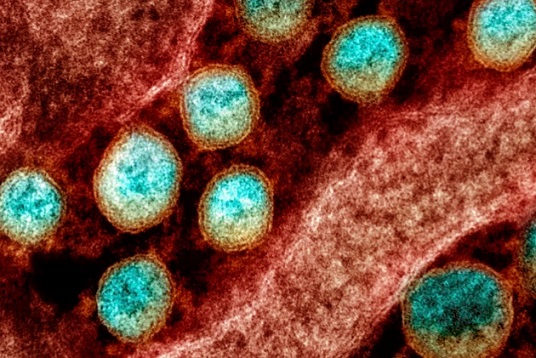New Evidence on the Role of T-Cadherin in COVID-19 and Its Link to Lung Damage and Vascular Issues
Nikhil Prasad Fact checked by:Thailand Medical News Team Mar 07, 2025 1 month, 6 days, 3 hours, 35 minutes ago
Medical News: Understanding the Impact of COVID-19 Beyond the Lungs
Since the start of the COVID-19 pandemic, researchers worldwide have been working to uncover the mechanisms by which the SARS-CoV-2 virus causes both immediate and long-term health complications. While it is widely understood that COVID-19 primarily affects the lungs, emerging evidence suggests that the virus also causes severe damage to the blood vessels, leading to complications that extend beyond the respiratory system.
 New Evidence on the Role of T-Cadherin in COVID-19 and Its Link to Lung Damage and Vascular Issues
New Evidence on the Role of T-Cadherin in COVID-19 and Its Link to Lung Damage and Vascular Issues
Scientists from Lomonosov Moscow State University and the Institute of Experimental Cardiology at the National Cardiology Research Center of the Ministry of Health of the Russian Federation have conducted an in-depth study on a lesser-known protein, T-cadherin, and its connection to COVID-19-induced lung fibrosis and endothelial dysfunction.
This
Medical News report highlights the groundbreaking findings of this study, which provide insights into how T-cadherin plays a role in COVID-19 pathology. By understanding this link, researchers hope to find new ways to mitigate long-term damage in patients who have recovered from COVID-19 but continue to experience lingering symptoms.
T-Cadherin and Its Role in Cell Integrity
T-cadherin, a member of the cadherin family of proteins, is primarily involved in cell-to-cell adhesion and plays an essential role in maintaining the integrity of endothelial cells, which line blood vessels. This protein also interacts with other molecules like VE-cadherin and β-catenin, both of which contribute to the stability and function of blood vessels. A disruption in the balance of these molecules can result in increased vascular permeability, inflammation, and fibrosis - all of which have been observed in severe COVID-19 cases.
The study conducted by the Russian research team found a significant decrease in T-cadherin expression in lung tissue samples taken from deceased COVID-19 patients. This decrease correlated with elevated levels of VE-cadherin and reduced β-catenin, suggesting that COVID-19 infection disrupts endothelial function, leading to long-term damage in blood vessels and lung tissue.
Exploring the Molecular Interactions in COVID-19
To further investigate the role of T-cadherin in COVID-19 pathology, researchers used cultured human endothelial cells to examine how different levels of T-cadherin affect VE-cadherin expression. They found that when T-cadherin levels were artificially increased, the expression of VE-cadherin decreased, further proving the interplay between these proteins. This finding suggests that a lack of T-cadherin in COVID-19 patients may contribute to the uncontrolled endothelial dysfunction observed in severe cases.
The researchers also conducted experiments using genetically modified mice that lacked the gene responsible for T-cadherin production. They found that these mice exhibited a protective effect against lung fibr
osis, a condition that results from severe lung injury and inflammation. When exposed to a lung-damaging agent (bleomycin), mice without T-cadherin showed significantly lower levels of fibrosis compared to normal mice, suggesting that T-cadherin plays a critical role in the progression of lung damage.
Endothelial Dysfunction and COVID-19 Complications
One of the key factors in COVID-19 severity is its impact on blood vessels. The study further investigated how T-cadherin deficiency affects endothelial dysfunction, particularly in response to angiotensin II - a molecule known to cause blood vessel constriction and contribute to hypertension. The researchers administered angiotensin II to both normal and T-cadherin-deficient mice over a period of 10 weeks and monitored their blood pressure, vessel integrity, and inflammatory markers.
Interestingly, while blood pressure levels remained relatively stable across both groups, the mice lacking T-cadherin exhibited a reduction in oxidative stress markers, specifically reactive oxygen species (ROS) production and Nox2 mRNA expression. These findings suggest that a lack of T-cadherin may offer some level of protection against endothelial dysfunction, reducing the risk of severe complications associated with COVID-19.
Potential Implications for COVID-19 Treatment
The study’s findings raise several important questions regarding the role of T-cadherin in disease progression and potential therapeutic targets for COVID-19-related complications. The results suggest that T-cadherin downregulation might be a protective response that reduces the likelihood of severe lung fibrosis and vascular dysfunction. However, the exact mechanisms through which T-cadherin influences these processes remain unclear and require further research.
Additionally, the study highlights the importance of considering endothelial health in the treatment of COVID-19. Many therapies have focused on reducing viral load and managing inflammation, but few have specifically addressed endothelial dysfunction as a primary factor in long-term complications. By targeting the pathways involved in T-cadherin regulation, researchers may be able to develop novel strategies to prevent lung fibrosis and improve vascular health in recovering COVID-19 patients.
Conclusion
The findings from this study provide valuable insights into how COVID-19 impacts lung and vascular health at a molecular level. By demonstrating the role of T-cadherin in endothelial dysfunction and lung fibrosis, the research offers new avenues for potential treatment strategies. Although much work remains to be done, these discoveries could pave the way for targeted therapies that mitigate long-term damage in COVID-19 survivors.
The study findings were published in the peer-reviewed journal: Frontiers in Cell and Developmental Biology.
https://www.frontiersin.org/journals/cell-and-developmental-biology/articles/10.3389/fcell.2025.1476329/full
For the latest COVID-19 News, keep on logging to Thailand
Medical News.
Read Also:
https://www.thailandmedical.news/news/covid-19-causes-upregulation-of-vimentin-expression-and-reduced-n-cadherin-expression
https://www.thailandmedical.news/news/french-study-provides-molecular-insights-into-endothelial-dysfunction-in-sars-cov-2-infection-and-long-covid-role-of-ace2-mediated-ve-cadherin-cleav
https://www.thailandmedical.news/news/japanese-study-finds-that-sars-cov-2-from-infected-epithelial-cells-disrupts-the-endothelial-barrier-by-downregulating-claudin-5-cldn5-a-tight-junctio
https://www.thailandmedical.news/articles/coronavirus
https://www.thailandmedical.news/pages/thailand_doctors_listings
